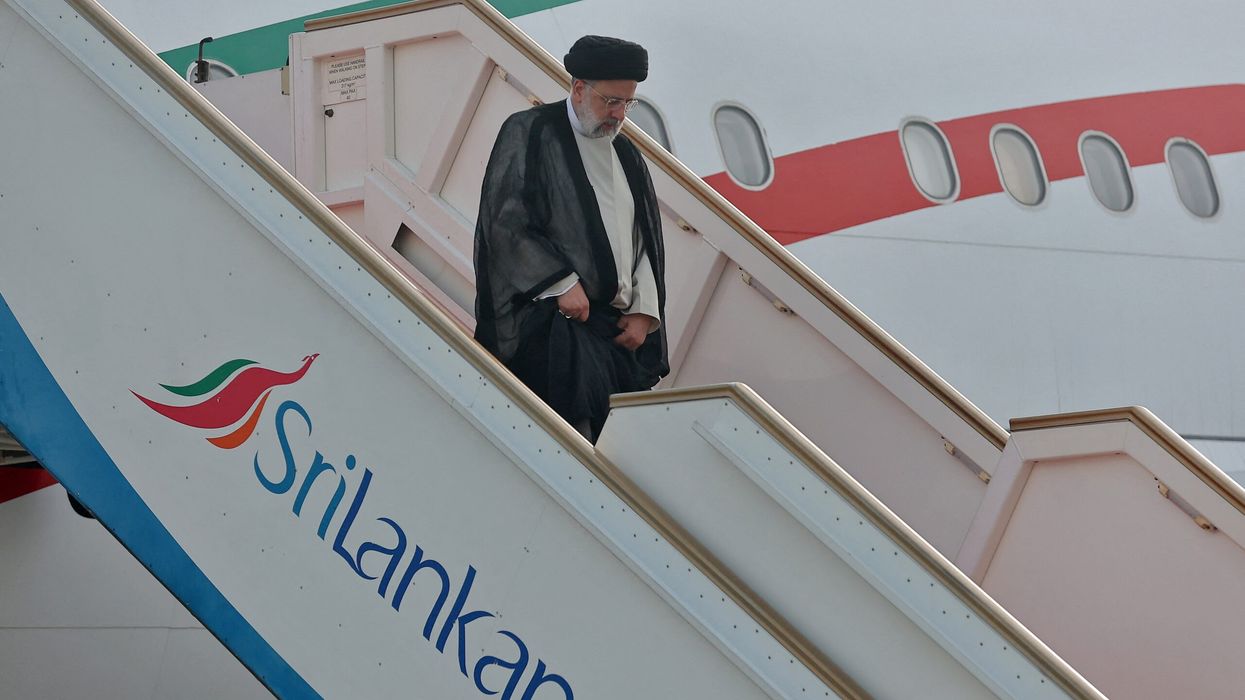IRANIAN President Ebrahim Raisi inaugurated a power and irrigation project in Sri Lanka on Wednesday but arrived in the country without his interior minister, who is wanted over a deadly bombing in Argentina thirty years ago.
Raisi flew in after a state visit to Pakistan he made alongside Ahmad Vahidi, accused by Argentina of orchestrating the 1994 attack on a Jewish community centre in Buenos Aires that killed 85 people.
Interpol issued a red notice requesting police agencies worldwide to take Vahidi into custody, and Argentina had asked both Pakistan and Sri Lanka to arrest him.
But the minister was not seen accompanying Raisi, who had arrived in Sri Lanka to inaugurate an Iran-backed power and irrigation project.
Iran's official news agency IRNA reported that Vahidi was back in Iran on Tuesday, where he attended a ceremony to induct a new provincial governor.
An official from Sri Lanka's foreign ministry told AFP that the interior minister was not listed as part of the Iranian delegation.
The 1994 assault has never been claimed or solved, but Argentina and Israel have long suspected the Iran-backed group Hezbollah carried it out at Iran's request.
Prosecutors have charged top Iranian officials with ordering the attack, though Tehran has denied any involvement.
The court also implicated Hezbollah and called the attack against the AMIA - the deadliest in Argentina's history - a "crime against humanity."
Dam project
Raisi's Airbus A340 aircraft first landed at an airport in southern Sri Lanka near the $514 million (£413mn) Uma Oya irrigation and hydro-electricity project.
It was due to be commissioned in March 2014 but international sanctions against Iran saw the project mired in a decade of delays, Sri Lanka has said.
Raisi told a public rally at the Uma Oya site that Western countries tried to convince others that they were the sole source of knowledge and technology, but "skilful Iranian experts" had developed their own capacities.
"Our enemies did not favour development and progress for Iran, but the Iranian people were determined in order to realise it," he said.
Sri Lanka funded most of the dam project after an initial investment of $50mn (£40.20mn) from the Export Development Bank of Iran in 2010, while construction was carried out by Iranian firm Farab.
Raisi then flew to the capital Colombo and was accorded a 21-gun salute before talks with Sri Lankan President Ranil Wickremesinghe, whose office said the visit symbolised "the cooperation between the two nations in this significant infrastructure endeavour".
The Uma Oya's two reservoirs are slated to irrigate 4,500 hectares (11,100 acres) of new land, while the hydro dam generators have a capacity of 120 megawatts.
Iran is a key buyer of Sri Lanka's tea, the island's main export commodity.
Sri Lanka is currently repaying a legacy debt of $215mn (£173mn) for Iranian oil by exporting tea. The country's only oil refinery was built by Iran in 1969.
Pakistan visit
Raisi arrived in Sri Lanka after a three-day visit to Pakistan that followed tit-for-tat missile strikes in January in the region of Balochistan, which straddles the two nations' porous border.
Tehran carried out the first strikes against an anti-Iran group inside Pakistan, with Islamabad retaliating by hitting "militant targets" inside Iran.
Both nations have previously accused each other of harbouring militants on their respective sides of the border.
The two sides signed eight MoUs while vowing to increase trade to $10bn (£8.04bn)in the coming years.
Raisi said Tehran was ready to exchange its prowess in industry, science, and technology with Pakistan while showing his resolve to remove trade barriers between the two neighbours.
The Iranian leader arrived on Monday with a large delegation and held detailed talks with prime minister Shehbaz Sharif, president Asif Ali Zardari and chief of army staff General Asim Munir focussing on key security and economic issues.
The two sides agreed to eradicate the threat of terrorism which caused a fissure in ties in January and voiced their support for the people of Palestine.
US warning
Meanwhile, a US official has said that anyone considering a business deal with Iran needs to be aware of the potential risk of sanctions from the United States.
"Just let me say broadly, we advise anyone considering business deals with Iran to be aware of the potential risk of sanctions. But ultimately, the government of Pakistan can speak to their foreign policy pursuits," Vedant Patel, Deputy Spokesperson of the US State Department, said on Tuesday (23) while responding to a question on the Iranian president's visit to Pakistan. (Agencies)













